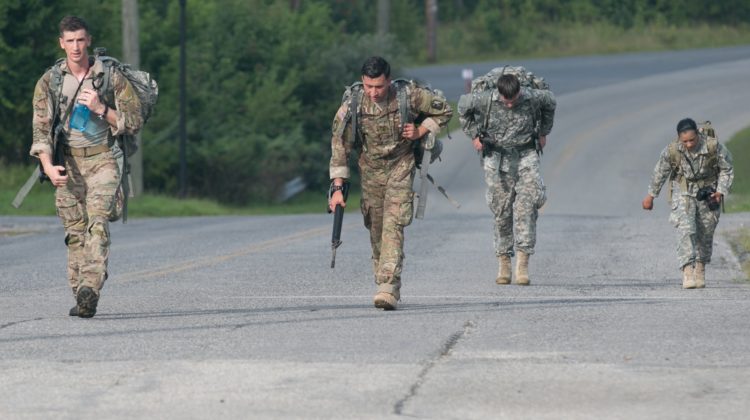I’ve been scouring social media for the past few days because I’ve gotten a few messages about training for selection and the gist of several of them had me wondering if some of the potential candidates were reading a few things that are out on social media and taking it as gospel.
The first and I’ve gotten several of these questions and they’re similar in the vein where young guys ask:
“Should I be training with 85-100 pound rucksacks to prepare for Selection?
The answer is, and we’ve stated that here and we’ll do it again is an emphatical No.
The training that candidates will face in the selection course will mainly be to carry 45 pounds of dry weight (minimum) during certain events. Does that mean that 45 pounds is all you will carry? Of course not. You will carry frequently more and later those weights will increase to at times over 100 pounds. Plus, during the team events in the Selection course, you’ll be asked to carry other items that will add a lot of weight to your load.
But you need to focus on the subject at hand. Don’t worry about the qualification course or what you’ll be carrying on the teams down the road. If you don’t pass Selection, you won’t have to worry about B and C.
Get used to working with a rucksack within the limits that the cadre set out. If you can carry a rucksack with a dry weight of 45 pounds over varied terrain on your own with little difficulty, then doing it in the school environment will not be a problem.
I really don’t recommend going over 55 – 60 pounds of weight in your ruck when training for selection. Why? Because any more than that and you’ll be putting yourselves at a much greater risk for injury. Like the workout programs we post on SpecialOperations.com every morning, they are designed to prepare your body to be functionally fit, with an all-over level of physical preparedness.
The key is not to over-train. During my time as a Selection cadre member, there were always candidates who weren’t ready for the physical and mental challenges in the course. But there were also a few, who had gone overboard with the preparation and once they began the course, would break down quickly and suffer injuries. And they invariably would tell us how they prepared to come to the course and we’d hear stories of vastly overloaded rucks for training.
That’s a sure-fire way to have knee and back issues down the road.
And once again, because this needs repeating often, don’t make it a habit of running with a rucksack in your preparation training…You’re going to get tempted to because some guy “heard from a guy, that knew a guy, who once may have been an operator” that you have to do that in order to pass Selection. Bunk.
None of the times and distances that will be specified for carrying a rucksack in Selection are set up as to require the candidate to run to make the time. You’ll have to move hard and fast, and it won’t be easy…it’s not supposed to be. If Special Operations Forces training was easy, everyone would do it.
But training for Selection by running with a ruck is a preparation for problems down the road and ultimate failure. Don’t do it.
Now for the flip-side of our discussion today. Under-training. Wait, What did you say?!?! Yes, because it leads to other questions/comments that I’ve seen recently is:
“So as long as I don’t quit and have a never say die attitude, I’m good…right?
Wrong. This may be a case of a miscommunication. And it may have been on my part so let me explain. In several earlier posts, I wrote that candidates should never quit and always have a can-do attitude. And that is absolutely correct.
But I believe a few readers have misconstrued my comments to mean that if you show up at Selection with an attitude that says “I’ll never quit”, then they’re guaranteed to pass the course. And that is completely wrong.
I don’t know what the numbers will show from today’s courses, but during my time there, we boarded and non-selected almost as many candidates for not meeting the course requirements than those who quit or voluntarily withdrew.
Be prepared, be ready to train and be confident in your abilities. With the advances of Social Media, there are few surprises in the Selection courses that you’ll face. One thing that the internet won’t and can’t explain is how tough it is. You’ll be tested as never before. Embrace the suck, keep focused on the task at hand and move on.
But the more prepared you are, the better you’ll do in the course. But like anything else, too much of a good thing can be bad. Don’t over-train and get hurt. Stick to the guidelines that are out there and get ready for the ride of your life. DOL
If anyone else has any questions, feel free to send them along to [email protected] or on Twitter @SteveB7FG and I’ll be glad to answer them and we may use it in our next video.
Photo courtesy of US Army










COMMENTS